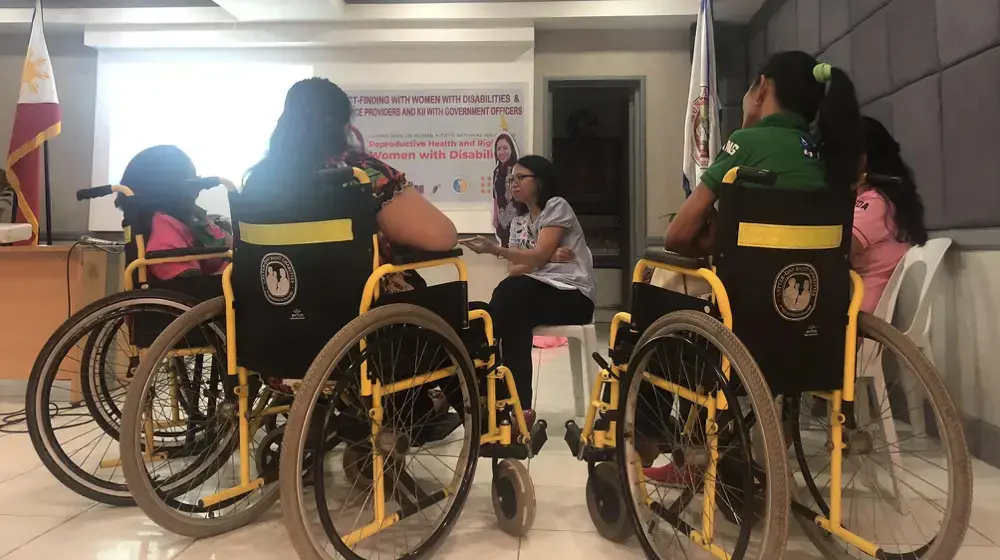“We're working with different organizations from the grassroots to the government”
“We're working with different organizations from the grassroots to the government”
The rights of women and girls with disabilities in the Philippines remain unfulfilled, especially their ability to access the sexual and reproductive health information and services on gender-based violence prevention and response. Attorney Krissi Shaffina Twyla Rubin is the Office-in-Charge of the Commission on Human Rights Philippines’ Gender Equality & Women’s Human Rights Center. She says the continuing barriers for women with disabilities include physical, communication, and social barriers – including attitudes about disabilities and the inadequate training of service providers.
Krissi Shaffina Twyla Rubin says inquiries and monitoring conducted together with women with disabilities before and during the pandemic surfaced critical gaps in the availability and accessibility of information and services about reproductive health services including gaps in the responses to gender-based violence against women with disabilities. “There were complaints about the insensitivity of service providers in dealing with cases. There was often no strategic mainstreaming of gender and disability sensitivity in government programmes.”
She says many of the staff are not trained on the intersections of gender and disability and the government doesn't have targeted programming specifically for women with disability.
“Sometimes we are the first responders for women with disabilities. I give legal advice and connect the woman with disability to psychosocial and legal support because we have partnerships with community organizations providing legal and psychosocial counseling.”
Twyla shared how the Commission responds to cases of gender-based violence against women with disabilities, including ensuring referral and survivor centered approaches. “Sometimes we are the first responders for women with disabilities. I give legal advice and connect the woman with disability to psychosocial and legal support because we have partnerships with community organizations providing legal and psychosocial counseling.”
She refers cases to the police so statements can be taken and complaints filed. She shares the story of a challenging case of a Deaf woman who was a survivor of gang-rape. “The act of violence was posted online in a community group,” she says. “It was only when it was posted that the woman came to us and sought help.”
Twyla stresses the importance of ensuring available and accessible services for women with disabilities. For Deaf survivors, this means access to sign language interpreters and connecting with organizations and advocacy groups for the provision of relay interpreters and even a deaf social worker. She works with volunteer sign language interpreters, Deaf and women with disability advocates, as well as partner legal NGOs like IDEALS Inc. in responding to cases of GBV against women with disabilities. She says every case that is properly handled helps uphold the rights of all women with disabilities. “It's an entire range of services, not just legal support,” she says. “We're working with different organizations from the grassroots to the government.”
“The health messages were not available to the Deaf community because there are no sign language interpreters available in public announcements by the government including public health announcements about accessing GBV services and protection.”
A key finding from the discussion with women with disabilities was difficulties accessing information from the government at the start of the pandemic. “The health messages were not available to the Deaf community because there are no sign language interpreters available in public announcements by the government including public health announcements about accessing GBV services and protection.”
A group of Deaf and sign language interpreters banded together and created a group that conducted sign language translation of the television news every day.
Twyla says in lockdown there was no means to report violence remotely. It was only in the middle of last year that they started remote reporting. Before the digital service, there were many barriers. “In order to report violence, you had to go out of your home. For many who have a disability, when you are a wheelchair user, that would not be an option because it would be difficult to find transport and difficult to access offices where you would be able to report an incident or complaint with the limited services.”
Twyla says the pandemic has intensified the vulnerability for women with disabilities. “Their mobility has been restricted during the lockdowns. They already face barriers, but with the imposition of quarantine measures, this has been exacerbated.”
“In lockdown, everything was closed including the shelters. That affects the social services and support from the government
and even how complaints are handled.”
Transport restrictions deepened financial stress. “They had to attend to their economic needs,” she says. “Most were much worse off and had to also find ways to support themselves.”
Twyla says there was limited access to medical services and government offices providing support in cases of gender-based violence. “In lockdown, everything was closed including the shelters. That affects the social services and support from the government and even how complaints are handled.”
The Commission on Human Rights released a joint memorandum circular with the Department of Interior and Local Government mandating gender-responsive COVID-19 responses including prompt, effective, and survivor-centered approach to GBV.
Learn more


